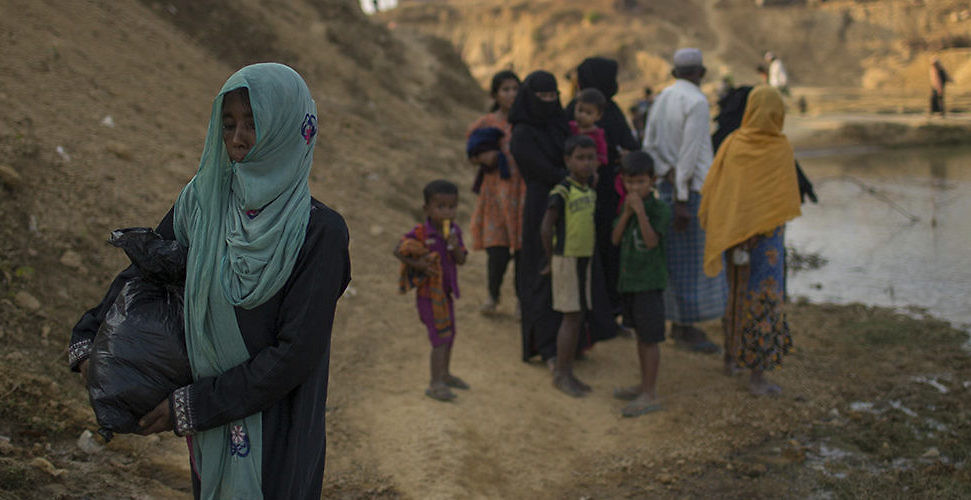Rohingya refugees in the Kutupalong camp after fleeing violence in Myanmar. Cox's Bazar, Bangladesh, February 7, 2017. (Turjoy Chowdhury/NurPhoto/Associated Press)
A United Nations report released earlier this month detailed widespread human rights violations against the Rohingya population by security forces in Myanmar’s northern Rakhine State, some of which its authors claim may amount to crimes against humanity. The question now is, will it lead to any meaningful improvement in the plight of this ethnic minority?
The Office of the UN High Commissioner for Human Rights (OHCHR) report was based on interviews with people who fled Myanmar after attacks on a border post in October last year, the ensuing counter military operations, and a lockdown in north Maungdaw. The report documents mass rape, killings—including of babies and young children—brutal beatings, disappearances, and other serious human rights violations.
Myanmar’s government has so far given no indication of whether it will accept the truth of the allegations and do something to address them. It also remains unclear what the response of the international community will be, specifically parties such as the UN, the 57 member states of the Organization of Islamic Cooperation (OIC), and Bangladesh.
The UN and OIC have been vocal critics of Myanmar’s record on the Rohingya, but whether they will back this up with aid to the internally displaced and refugee populations is the issue at hand. Neighboring Bangladesh, meanwhile, has offered only controversial resettlement options for those fleeing across its border. Regional bloc the Association of South East Asian Nations, meanwhile, is hamstrung by its traditional policy of non-interference in the internal affairs of its members.
The OHCHR report undoubtedly sent a strong message and puts tremendous pressure on Myanmar to act. After its release, the government said it was “deeply concerned” about the “very serious” allegations of atrocities. In a statement released on February 8, the Ministry of Foreign Affairs said that the government was investigating the allegations and would take legal action against the perpetrators if there was clear evidence of human rights abuses.
The home ministry, controlled by the military, has set up a team of five high-ranking police officials to investigate abuses committed by the security forces. The military has also said that five policemen have been sentenced to two months’ detention and three senior officers had been demoted over “selfie”-style footage of police kicking and beating Rohingya in the village of Koe Tan Kauk in November last year. The military has also said the man believed to have led the Maungdaw border outpost attacks, which killed nine policemen, was sentenced to death on February 10.
Still, because of the delicate and sensitive nature of the issue and international scrutiny, Aung San Suu Kyi—Myanmar’s de facto leader—is likely to continue to handle the matter with caution. While the National League for Democracy government initiates its own investigations, behind the scenes Suu Kyi is likely to reach out to the military commander-in-chief Senior General Min Aung Hlaing, seeking his intervention.
Because of her international stature as a democratic icon, there are usually high expectations placed on 1991 Nobel peace laureate Suu Kyi. She has already received her share of criticism from governments and rights groups around the world for her lack of action to date. Yet Suu Kyi’s role is crucial but limited. Myanmar’s democratization is still incomplete, with the hybrid nature of its political system seeing the civilian government and military share power.
Suu Kyi has in fact done much with her limited capacity on the Rohingya issue. She created a commission led by former UN Secretary-General Kofi Annan despite opposition from groups including the Union Solidarity and Development Party, which governed the country for five years under President Thein Sein. The NLD also constituted a commission led by the military-backed Vice President Myint Swe and sent a high-level delegation to Bangladesh in its attempt to resolve the Rohingya conundrum. Furthermore, the government has formed a leading body to accelerate the process of issuing national verification cards to Rohingya waiting for citizenship.
But what Suu Kyi and her NLD government could and should still do—instead of denying allegations—is continue working together with the military leadership to end the atrocities and provide adequate humanitarian assistance to the affected population. They should ensure appropriate punishment is given to human rights violators. And they also need to lay out concrete and systematic policies and plans for addressing the fundamental problems of the Rohingya, such as resolving questions over identity, nomenclature, and citizenship status once and for all.
The Bangladeshi government is meanwhile seeking the international community’s assistance in developing Thengar Char Island and in transporting Rohingya refugees there. The plan has drawn criticism around the world, given that the Bay of Bengal-located island is lashed by high tides year-round and submerged during the monsoon season. It is largely uninhabitable marshland and reached by several hours of boat travel from the Bangladeshi mainland. The relocation plan was last proposed in 2015, but the government suspended it after aid groups and rights activists criticized it. It was revived following the arrival of about 65,000 Rohingya from Myanmar in October and November last year.
Under the circumstances, the UN and organizations such as the OIC face pressure to extend all possible assistance to the Myanmar government in its attempt to address the problem. This includes providing financial aid and logistical support, as well as the possibility of resettling some of the most vulnerable Rohingya population in safer areas of Myanmar or other willing third countries, as with other vulnerable refugee populations around the world.
Dr. Nehginpao Kipgen is Assistant Professor and Executive Director of the Center for Southeast Asian Studies, Jindal School of International Affairs, O.P. Jindal Global University.





